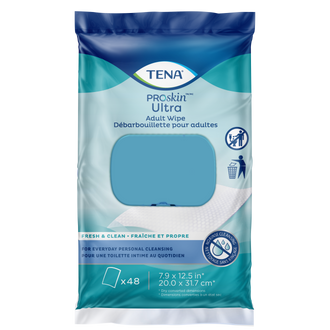Sep 30, 2024
Imagine this: You're settling into bed after a long day, hoping for some quality intimate time with your partner. But tonight, something just feels different. You’re not as eager as you used to be, and it’s not just because you’re tired. Something feels different, and if this sounds familiar, you’re not alone.
Menopause can stir things up, including how you feel about intimacy. Let’s chat about how menopause could affect your libido and explore ways to keep your intimate life satisfying.
Understanding Menopause Symptoms and The Impact on Sexual Desire
There are a range of symptoms and body changes that might affect how you feel about sexual desire and intimacy during your menopause years.1 They could include incontinence, hot flashes, night sweats, and weight changes.1
It’s important to know that these symptoms can influence your sexual desire and overall libido and once you understand that these changes are a normal part of menopause you can approach them with a positive mindset.
Does Menopause Reduce Sex Drive for Every Woman?
Menopause and its symptoms affect each woman differently, and while many women may notice a decrease in libido, some may experience an increase.1 Hormonal changes play a significant role in these shifts, influencing a range of physical, mental, and emotional changes that can affect your sexual desire.1
Medical Conditions Leading to Incontinence
During perimenopause and menopause, it's common to notice a decrease in your interest in sexual activity, and this can be linked to various symptoms and changes your body is experiencing.1
For example, incontinence can significantly impact your desire for intimacy. The fear of leakage or the discomfort associated with bladder control issues might make you feel self-conscious or anxious, leading to a reluctance to engage in sexual activity.1
To manage these concerns and maintain your confidence, you could talk to your partner about how you’re feeling and how it is impacting your desire for intimacy. Communication in any relationship is key, after all.
Changes in Libido During Menopause
Hormonal shifts in estrogen, progesterone, and testosterone play a significant role in how you feel about sex.1 These fluctuations can lead to a noticeable drop in sexual desire.1
Recognizing how symptoms like incontinence and fatigue contribute to a decreased libido is the first step in managing them and finding ways to keep your intimate life satisfying during menopause.1
Navigating Arousal During Menopause
Enhancing arousal during menopause can involve trying new approaches and being open to adjustments that align with your changing body. Here are some strategies to help maintain and even enhance arousal:
- Try Something New with Different Types of Stimulation: Exploring new ways to stimulate arousal can be exciting and rewarding.2 This could mean trying different types of touch, exploring new erogenous zones, or incorporating sex toys into your routine.2
- Consider Hormonal Therapies: If hormonal changes are significantly affecting your arousal, you might need to consider discussing hormonal therapies with your healthcare provider.2
Remember, it's essential to be patient with yourself and communicate openly with your partner during this time.2 Each person’s experience with menopause is unique, and finding what works best for you is a personal journey toward finding pleasure in the menopausal years.
Dealing with Vaginal Dryness During Intimacy
Vaginal dryness is another common issue during menopause, often due to decreased estrogen.2 This can make having sex uncomfortable, or even painful, but there are simple fixes. Using vaginal lubricants and moisturizers can really help.1 Choose products designed specifically for this purpose and apply them regularly to keep things comfortable.1
Why Does Libido Fluctuate Around Menopause?
Libido can fluctuate during menopause due to a combination of biological, psychological, and social factors. Along with incontinence, other symptoms like brain fog, headaches, hot flashes, and weight changes can make it challenging to feel present and connected with your partner.1
The fatigue, insomnia, night sweats, restless legs syndrome, and sleep apnea that often accompany menopause can leave you too exhausted for sex.1 When you're constantly tired or struggling with sleep, it’s hard to find the energy and motivation for intimacy.1
On top of that, emotional symptoms such as anger, anxiety, depression, frequent mood swings, and low self-esteem can further diminish your libido.1 These emotional ups and downs can create a sense of disconnect with your partner, making it harder to enjoy the closeness you once shared.1
The Role of Mental Health in Sexual Desire
Mental health has an influence on your sexual desire, with anxiety, depression, and frequent mood shifts all directly impacting libido.1 These emotional shifts may turn you off sex entirely1, as when you’re feeling anxious or depressed, it’s harder to feel connected with your partner or to engage in intimate activities.
To manage these mental health challenges and maintain sexual desire during menopause, it’s important to prioritize your mental well-being. In some cases, medication may be necessary to manage more severe symptoms, and it’s worth discussing these options with your healthcare provider.1
How Menopause Physically Affects Your Sex Organs
Menopause also physically affects your sex organs.1 As estrogen levels decline, your vaginal walls may become thinner and less elastic, which can lead to discomfort or pain during sex.1 These changes can make intimacy less enjoyable and may decrease your interest in sexual activity.1
But don’t worry—there are ways to navigate these changes and still enjoy a satisfying sex life. With a bit of adjustment and the right strategies, you can find new ways to connect and keep intimacy enjoyable during menopause.
Tips for Enjoying Sex and Masturbation During Menopause
Menopause can bring some changes to your sexual experiences, but with a few practical tips, you can keep enjoying those intimate moments, whether you’re with a partner or on your own.
Strengthen Your Pelvic Floor
Pelvic floor exercises, Kegels, can work wonders for your pelvic floor.1 These exercises help strengthen the muscles around your pelvic area, which can boost low (hypotonic) muscle tone and strength.1
Strengthening your pelvic floor can also help with bladder control, which is a bonus.1 For more tips on managing bladder health, check out TENA's Bladder Training Techniques and Treatment.
With these tips, you can keep your intimate moments satisfying and enjoyable during menopause. It’s all about finding what works for you and making the most of your experiences.
If you feel like you do need some extra support and a confidence boost, TENA’s range of incontinence products can add some extra protection, and confidence.
References
1. Healthline. ‘Does Menopause Affect your Libido?’. 3 April 2024. Accessed 16 August 2024. Available from: https://www.healthline.com/health/menopause/menopause-libido
2. John Hopkins Medicine. ‘Sex After Menopause’. 2024. Accessed 19 August 2024. Available from: https://www.hopkinsmedicine.org/health/wellness-and-prevention/how-sex-changes-after-menopause#:~:text=More%20than%20a%20third%20of,make%20sexual%20arousal%20more%20difficult.
3. WebMD. ‘Ways to Make Sex After Menopause More Comfortable’. 9 March 2024. Accessed 19 August 2024. Available from: https://www.webmd.com/menopause/menopause-comfortable-sex







